

Too Much Protein On a Carnivore Diet?


Starting the carnivore diet often brings up concerns about protein intake, with many wondering, “Is it possible to consume too much protein on a carnivore diet?” This question stems from a widespread misconception that excessive protein is detrimental to health. However, the reality is more nuanced.
Our practice, grounded in extensive research and client experiences, addresses this concern head-on. We aim to dispel myths and provide clarity on the carnivore diet’s approach to protein consumption. Understanding the balance and benefits of protein is crucial, and we’re here to guide you through it.
What Is the Carnivore Diet?
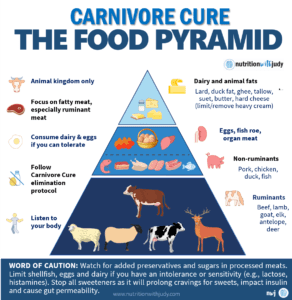

The carnivore diet, centered on animal-sourced foods, presents various adaptations to suit personal health objectives and preferences. These adaptations each have distinct characteristics:
The Beef-Only Carnivore Diet
Focusing solely on beef for its simplicity and potential in elimination diets, this method is recommended for individuals with autoimmune or chronic conditions seeking remission or support. Nonetheless, a long-term commitment may necessitate diversifying meat sources for balanced nutrition.
The Lion Diet
This stricter variation limits intake to ruminant meats, salt, and water, serving as a foundation for elimination diets aimed at autoimmune and gut health improvements, with the option to gradually reintroduce other meats.
The Nose-to-Tail Carnivore Diet
Advocating for the inclusion of organ meats alongside muscle meat, this approach aims at a holistic nutrient intake. We advise caution with liver and kidney intake to prevent nutrient overloads, such as vitamin A toxicity, particularly in those with specific liver conditions.
The Meat-Only Carnivore Diet
Broadening the spectrum to include all types of muscle meat while excluding organ meats, dairy, and eggs, this diet is ideal for those pursuing an elementary elimination diet and are tolerant of muscle meats.
The Zero-Carb Carnivore Diet
This diet emphasizes foods devoid of or containing negligible carbohydrates, incorporating dairy, eggs, and all meats with an emphasis on meat and animal fats. Seasonings may be included, making it suitable for those without autoimmune or significant chronic health issues who also tolerate dairy and/or eggs.
The Carnivore Keto Diet
Merging ketogenic principles with the carnivore lifestyle, this low-carb, high-fat diet integrates keto-friendly foods with low plant anti-nutrients, such as avocados and coconut oil, catering to metabolically healthy individuals with resolved or minimal chronic health concerns.
The Carnivore-ish Keto Diet
Offering greater flexibility, this variant incorporates additional ketogenic elements while prioritizing animal-based foods. Suitable for metabolically healthy individuals, it includes keto sweeteners, some nuts, and keto varieties, maintaining a meat-centric diet without succumbing to food addiction issues.
Animal-Based Diet
This inclusive version centers on animal products while permitting fruits, honey, and raw dairy, observed to usually only benefit metabolically flexible individuals and elite athletes in clinical settings. We don’t recommend this variation generally because of the risks of mixing fruit with high fat.
These carnivore diet variations cater to a wide range of dietary needs and health goals, focusing on the adaptability and personalization of the diet to individual circumstances.
What Are the Benefits of the Carnivore Diet?
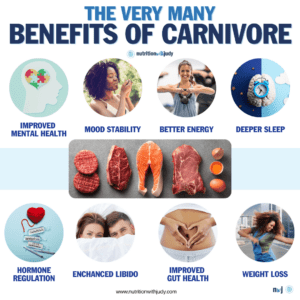

The carnivore diet has numerous benefits, making it an attractive option for those seeking to improve their health and well-being. This comprehensive overview highlights some of the many reasons individuals might choose to explore this dietary approach.
One of the primary benefits of the carnivore diet is its simplicity and effectiveness in eliminating various health issues. By focusing on meat-based foods, we have seen many clients show significant improvements in their digestive health, as the diet naturally eliminates many common irritants found in plant-based foods, such as fiber, lectins, and phytic acid. This reduction in antinutrients and irritants can lead to less bloating, gas, and inflammation in the gut, providing relief for those with irritable bowel syndrome (IBS), Crohn’s disease, and other digestive disorders.
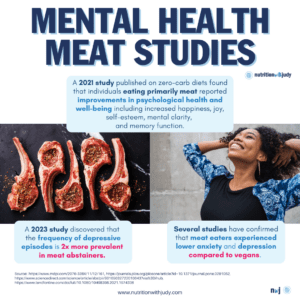

The carnivore diet is also well-known for its ability to support mental health improvements. Our clients have reported reductions in anxiety, depression, and mood swings, attributed to the diet’s stabilizing effect on blood sugar levels and the elimination of foods that can negatively impact brain chemistry. The high levels of omega-3 fatty acids, vitamins B12, and D found in meat are crucial for brain health, offering a nutritional foundation that may support cognitive function and emotional well-being.
Weight loss and body composition changes are also significant benefits of the carnivore diet. The high protein content promotes satiety, helping individuals naturally reduce calorie intake without feeling deprived. Additionally, the diet’s focus on fat as a primary energy source can lead to improved metabolism and fat burning, aiding in weight loss and muscle definition.
Athletic performance and recovery can be enhanced on the carnivore diet due to the optimal levels of amino acids and nutrients such as creatine found in animal products. These components are essential for muscle repair, growth, and overall physical performance, making the diet popular among athletes and fitness enthusiasts.
Additionally, the carnivore diet can contribute to improved immune function. By removing sugar and processed carbohydrates, which can suppress immune activity, the diet helps strengthen the body’s natural defenses against illnesses and infections. The nutrient-dense nature of animal products provides all essential vitamins and minerals in highly bioavailable forms, supporting overall health and resilience.
For individuals struggling with autoimmune conditions, the carnivore diet offers a different approach to managing symptoms. The elimination of potential dietary triggers can help reduce inflammation and autoimmune responses, offering relief for conditions such as rheumatoid arthritis, lupus, and multiple sclerosis.
The diet’s impact on hormonal balance is another reason for its consideration. By providing a rich source of cholesterol and saturated fats, essential for hormone production, the carnivore diet can help normalize levels of testosterone, estrogen, and thyroid hormones, potentially alleviating issues related to hormonal imbalances such as infertility, PCOS, and menopausal symptoms.
The carnivore diet offers a range of benefits that cater to various health goals, from improving digestive and mental health to enhancing physical performance and hormonal balance. Its simplicity, coupled with its profound impacts on overall well-being, makes it a dietary approach worth considering for those seeking to optimize their health.
You can learn more in-depth about carnivore diet benefits here.
Who Should Try the Carnivore Diet?
The carnivore diet appeals to a broad audience, transcending age, background, and health status. This dietary approach is particularly versatile, making it adaptable to meet the needs of almost anyone interested in exploring its potential health benefits.
Individuals drawn to the carnivore diet come from various walks of life, each with unique health goals and conditions. From those struggling with autoimmune diseases seeking relief from symptoms, to athletes aiming to optimize performance and recovery, the diet offers a tailored approach to nutrition. Its simplicity and focus on high-nutrient foods make it an effective elimination diet, helping to identify food sensitivities and intolerances that might not be apparent on a more traditional diet.
In addition, the diet’s adaptability means it can serve as an intervention for specific health issues or a long-term lifestyle choice. People with chronic conditions such as metabolic syndrome, digestive disorders, and inflammatory diseases may find the carnivore diet particularly beneficial. By eliminating plant-based foods that can sometimes trigger adverse reactions, individuals often report improvements in energy levels, mental clarity, and overall well-being.
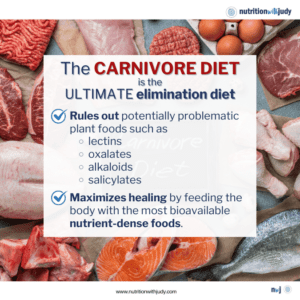

The carnivore diet is not one-size-fits-all; it’s highly personalized. Whether starting with a strict meat-only protocol or incorporating a wider range of animal products, the diet can be adjusted based on personal health responses and nutritional needs. It encourages a deep dive into one’s health, offering a pathway to discovering what foods best support individual health goals.
This diet is an invitation to explore root-cause healing, focusing on nutrient-dense, bioavailable foods to support the body’s natural healing processes. Whether you’re dealing with specific health challenges, looking to improve overall health, or simply curious about the benefits of a meat-focused diet, the carnivore diet provides a framework for personal experimentation and health optimization. It stands as a testament to the power of dietary intervention in achieving optimal health, tailored to the individual’s unique circumstances and needs.
What Is Protein?
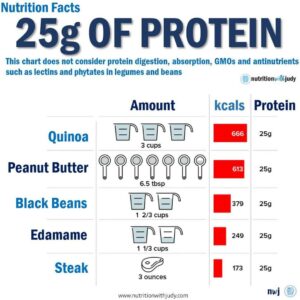

Protein is fundamental to our health, acting as the building blocks of the body. Comprising chains of amino acids, it’s vital for constructing, repairing, and maintaining muscles, organs, and other bodily tissues. Found in every cell, protein plays a critical role in creating enzymes and hormones that regulate bodily functions, including digestion, metabolism, and growth.
Our body requires various amino acids, some of which are essential, meaning they must be obtained through diet because the body cannot produce them. Proteins derived from animal sources, such as meat, dairy, and eggs, are considered complete, providing all essential amino acids in optimal ratios for human health.
Conversely, most plant-based proteins are incomplete, lacking one or more essential amino acids. Thus, protein not only serves as a structural component but also as a crucial nutrient supporting overall health, immune function, and muscle repair and growth.
The Nuance Behind Complete Proteins
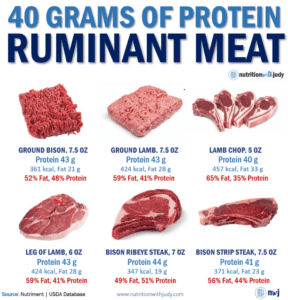

Protein, an essential component of the human diet, provides the body with 20 amino acids from animal sources, crucial for various physiological functions. The body assimilates these naturally occurring amino acids from food, linking them into long chains to form the proteins necessary for optimal functioning. Among these, nine are classified as essential because the body cannot synthesize them, underscoring the importance of dietary intake.
Animal sources are particularly prized for protein for several reasons:
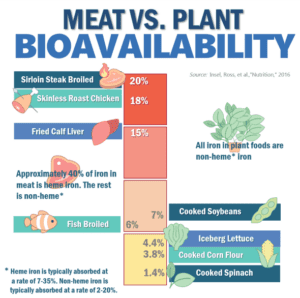

- Enhanced Bioavailability: Animal proteins offer superior bioavailability compared to plant proteins, meaning the body can absorb and utilize these nutrients more efficiently. This higher quality of protein from animal sources contributes to better digestion and assimilation of nutrients.
- Limiting Amino Acids: The concept of limiting amino acids highlights the importance of consuming all essential amino acids in adequate amounts. Plant proteins often fall short in one or more essential amino acids, limiting protein synthesis to the availability of the least abundant essential amino acid. This is a common challenge for those relying solely on plant-based protein sources.
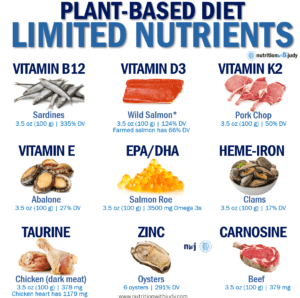

- Complete Proteins: Animal proteins, including meat, eggs, and dairy, provide all essential amino acids in the right ratios required by the body. Additionally, they supply unique nutrients not found in plant foods, such as certain forms of vitamins and healthy fats, crucial for brain, hormone function, and overall health.
This understanding of protein’s role and sources illuminates why animal-based diets are often recommended for their nutritional completeness, supporting various aspects of human health from muscle maintenance to enzyme and hormone production.
Recommended Protein Requirements for the Carnivore Diet
The carnivore diet eliminates carbohydrates while focusing on protein and fat. A starting recommendation is 0.8 to 1 gram of protein per pound of desired body weight, with 75% of total calories derived from fat. Given the unique biological makeup of each individual, determining the optimal protein-to-fat ratio may require experimentation.
Many find success with a ketogenic carnivore diet, which is higher in fat. However, individuals with certain conditions, including Chronic Inflammatory Response Syndrome (CIRS), may need to prioritize gut healing and opt for a higher protein intake if not currently fat-adapted. High-protein carnivore diets have been effectively used for short-term weight loss in some cases.
This personalized approach acknowledges the diverse needs and health objectives of individuals, advocating for a personal dietary plan that achieves optimal health outcomes. Learn more about carnivore diet macros here.
Is There Such a Thing As Too Much Protein On a Carnivore Diet?
While not every carnivore diet is high in protein, concerns about excessive protein intake often arise among those considering this nutritional approach. A prevalent misconception has been that high-protein diets may negatively affect kidney function, leading to widespread recommendations for protein restriction, especially in individuals with chronic kidney disease.
However, current evidence does not substantiate these claims. With evolving perspectives on dietary components such as sodium and red meat, it’s becoming increasingly important to reassess the stance on high-protein diets. This shift in understanding prompts a reevaluation of the safety and health implications of consuming a diet rich in protein, challenging outdated dietary paradigms and encouraging a more nuanced consideration of protein’s role in overall health and disease management.
Is High Protein Intake Harmful for the Kidneys?
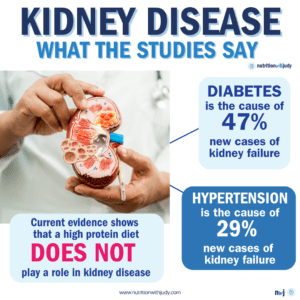

Diabetes emerges as the predominant cause of kidney failure, accounting for 47% of new cases, according to the American Kidney Fund, with hypertension trailing at 29%. Together, these two factors contribute to 76% of all kidney failure incidents. Contrary to widespread belief, high-protein diets have not been recognized as a risk factor for chronic kidney disease (CKD), with more than 15 distinct risk factors identified in one study, excluding high-protein intake.
Increasing evidence suggests no direct link between protein consumption and the development or exacerbation of kidney disease in individuals without preexisting conditions. Furthermore, dietary protein has not been proven to play a role in the onset of kidney disease.
Regarding individuals already diagnosed with kidney disease, the scientific backing for protein intake restrictions remains inconclusive. Research focusing on chronic renal failure highlighted that a low-protein diet might slow down the progression of kidney failure exclusively in males with primary glomerular disease, showing no benefits for female patients within the same study.
Given that primary glomerular disease represents a minor fraction of kidney diseases, the low-protein dietary approach seems beneficial for a limited group. Reviews, including those from Cochrane in 2020 and Kidney360 in 2022, support the notion that low-protein diets and protein restrictions for kidney disease patients are generally unnecessary.
Some research advocates protein restrictions to marginally slow kidney function decline, yet these findings lack the statistical significance to recommend low-protein diets universally for kidney disease patients. Since type 2 diabetes and hypertension are the main culprits behind kidney disease, focusing on reducing carbohydrate and sugar intake rather than protein could be more logical.
Low-carb and ketogenic diets, such as the carnivore diet, have been shown to potentially reduce or even eliminate the need for diabetes and blood pressure medications, indicating a neutral or beneficial impact on kidney function. Further research is warranted to fully understand the effects of low-carb diets on kidney health.
Is High Protein Safe On a Carnivore Diet?
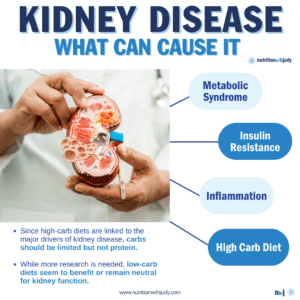

High-protein carnivore diets may offer benefits for specific goals, such as weight loss, but are not generally advised for sustained periods. Consisting of only protein and fat, excessively lean diets can lead to adverse effects, including protein poisoning, also known as “rabbit starvation” or “mal de caribou.” This condition arises from consuming overly lean meats, leading to malnutrition due to insufficient fat intake. While some may experiment with high-protein carnivore diets in the short term for weight reduction, this approach is not recommended for long-term health maintenance.
A diet emphasizing higher fat and moderate protein intake is more sustainable for the long haul. The definition of “moderate” protein varies by individual, but it often falls between 0.8 grams to 1 gram of protein per pound of ideal body weight. Ensuring adequate fat intake, at least 70% of total caloric intake, is crucial for prolonged adherence to a carnivore diet. This balanced approach supports the body’s nutritional needs while promoting overall health and wellness.
You can learn more about this nuanced information here.
Closing Thoughts
The safety of high-protein intake, especially within the context of the carnivore diet, has been a topic of considerable discussion and analysis. Still concerned if there’s too much protein on a carnivore diet? Contrary to common concerns, current evidence does not support the notion that high-protein diets negatively impact kidney function in healthy individuals.
Misconceptions about protein poisoning or “rabbit starvation” highlight the necessity of balancing lean meat with adequate fat intake to prevent malnutrition. While high-protein carnivore diets may serve short-term objectives including weight loss, they are not recommended for long-term sustainability. Instead, a diet higher in fat with moderate protein levels is advised for prolonged adherence, aligning with the body’s nutritional needs without adverse effects.
Further, diabetes and hypertension, not high-protein intake, are the primary drivers of kidney disease, suggesting that dietary focus should perhaps shift towards limiting carbohydrates and sugars rather than proteins. The narrative around protein’s role in diet and health is evolving, with recent studies and reviews indicating that fears surrounding high protein consumption and kidney health are largely unfounded.
This growing body of evidence supports the safety and potential benefits of appropriately balanced protein intake in diets such as the carnivore diet, advocating for a more nuanced understanding of protein’s impact on health.
Work With Our Trusted Carnivore Diet Functional Nutritional Therapy Practitioners
The Nutrition with Judy practice is honored to be a trusted carnivore diet practitioner support serving clients from around the globe. We’re passionate about helping our clients achieve root-cause healing in order to lead the best quality of life possible that’s nearly symptom-free. Our team is dedicated to helping debunk mistruths and support optimal health in our clients. We welcome you to explore our free resources and are always available to support you through personalized protocols. Our Symptom Burden Assessment (SBA) is the perfect starting point for discovering your root cause and is required to work with our team— you can learn more in-depth about this powerful tool here.


